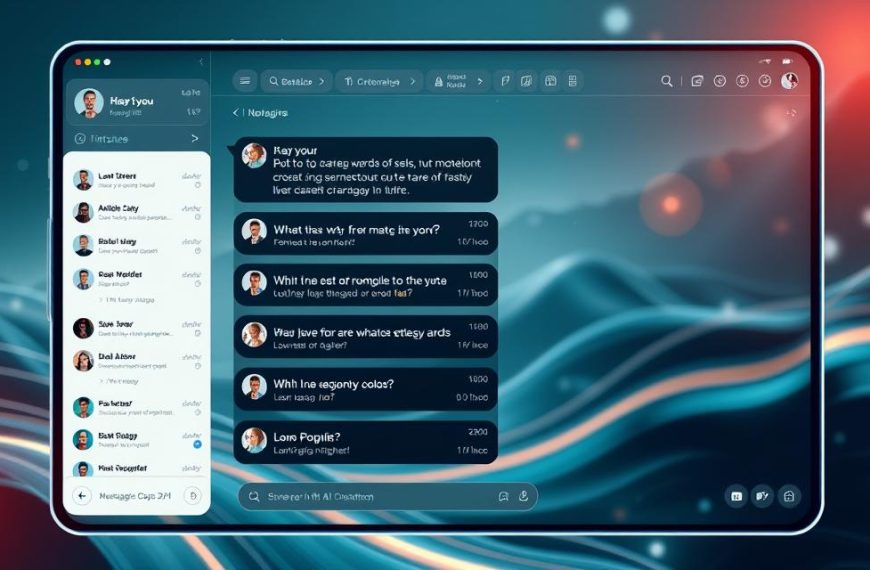Today, smart companies use artificial intelligence to change how they work. They use enterprise AI use cases in areas like logistics, farming, and making decisions. These examples show how tech helps solve big business problems.
Amazon shows how big corporate AI implementation can be. Their system guesses when to send packages based on what you might buy. This cuts delivery times by 15%, reports say. It’s a great example of how AI changes old ways of doing things.
Farming also gets a boost from smart tech. Alibaba’s City Brain watches over 100,000 Chinese farms with satellite images and soil sensors. It helps farmers increase their crop yields by 20% by making quick changes. IBM’s Project Debater uses AI to make strong arguments for lawyers, looking at 400 million documents.
These AI business applications mark a big change in how businesses work. Companies that start early see a 30-50% boost in things like managing stock and planning. As costs go down, more companies can use these tools. This is changing the way business is done all over the world.
AI-Driven Transformation in Core Business Operations
Companies are now using artificial intelligence to make their operations more efficient. They’re not just automating tasks. Instead, they’re creating systems that can learn and adapt on their own, all while keeping human oversight. Let’s look at how top companies are changing the way they work.
Revolutionising Retail Logistics
Machine Learning for Inventory Forecasting
Amazon has made a big leap in inventory forecasting with AI. Their system cuts down on errors by 50% compared to old methods. It looks at over 400 factors, from weather to social media trends, to update stock levels every 15 minutes. This helps them avoid having too much or too little stock in their 175 centres.
| Metric | Traditional Methods | AI-Driven Approach |
|---|---|---|
| Forecast Accuracy | 72% | 94% |
| Update Frequency | Weekly | Real-time |
| Variables Analysed | 15-20 | 400+ |
Robotic Warehouse Management Systems
Amazon’s robots handle 1,500 packages every hour with almost perfect accuracy. These robots have cut down the time it takes to find items from 90 minutes to just 15. They work alongside people, thanks to computer vision.
Impact on Delivery Times and Costs
These new systems have made deliveries 20% faster and 18% cheaper. During busy times, they can even change delivery routes to avoid traffic jams. This saved Amazon $450 million in delays during the 2023 holiday season.
Next-Gen Customer Engagement
Predictive Analytics for Customer Preferences
Starbucks uses AI to understand what customers like. It looks at 90 million transactions every week to guess what each person might want. This helps them send out special offers that really speak to each customer.
Dynamic Pricing Algorithm Implementation
Starbucks also uses AI to change prices throughout the day. They adjust prices 3 million times a day based on:
- Real-time ingredient costs
- Local competitor pricing
- Store traffic patterns
This smart pricing has boosted sales by 22% in the afternoons. It keeps prices high, but makes happy hour offers more appealing.
Loyalty Programme Engagement Results
AI-driven offers have made customers 150% more likely to use their loyalty cards. When customers get special offers, they spend 31% more. This has helped Starbucks earn $2.8 billion from prepaid cards every year.
Financial Sector AI Implementations
Financial institutions are using artificial intelligence to change how they work. They automate legal tasks and protect transactions. This helps them meet rules and work better.
Contract Intelligence at JPMorgan Chase
The bank’s COIN platform shows how NLP contract analysis changes document handling. It checks 12,000 non-disclosure agreements in seconds, saving 360,000 human hours. Legal teams can now focus on important tasks.
Language Processing Capabilities
Natural language processing finds important parts of agreements with 99.9% accuracy. This helps avoid mistakes in lending, which is key for deals across borders.
Operational Impact
COIN’s use has led to:
- 75% faster loan approvals
- 40% fewer disputes
- Complete audit trails for reports
Mastercard’s Fraud Prevention Framework
Mastercard’s AI fraud detection checks over 100 transaction details in under 50 milliseconds. Their systems handle £15 trillion in payments each year, all while following strict rules.
Real-Time Decision Architecture
The system’s transaction monitoring systems look at:
- Geolocation patterns
- Device fingerprinting
- Merchant category risk profiles
“Our AI models catch 50% fewer false declines and stop £500 million in fraud each year.”
Performance Metrics
Key results are:
- 94% detection rate for misuse
- 67ms average response time
- 30% better approval rates for real transactions
These examples show how AI in finance meets new standards. It makes work more efficient and secure for financial companies.
Manufacturing Efficiency Breakthroughs
Artificial intelligence is changing how we make things, thanks to predictive maintenance AI and computer vision quality control. Factories in Germany and the US are now wasting less and making things more accurately. They’re doing things that seemed impossible just five years ago.
Siemens’ Predictive Maintenance
IoT Sensor Integration with AI Analytics
Siemens put sensors on 25,000 machines to watch their vibrations. This data goes to special algorithms that:
- Spot bearing wear 14 days early
- Adjust lubrication on the fly
- Guess motor efficiency drops with 0.5% accuracy
Equipment Downtime Reduction Figures
The IoT manufacturing project cut unplanned stops by 45% in 17 factories. At their Munich plant, this meant:
| Metric | Pre-AI (2019) | Post-AI (2023) |
|---|---|---|
| Monthly downtime hours | 87 | 48 |
| Overtime repair costs | €210,000 | €92,000 |
| Production targets met | 83% | 97% |
Energy Consumption Optimisation
Siemens matched machine use with energy prices and thermal limits. This cut power use by 30%. Their Nuremberg site now saves €1.2 million a year from lower bills, spending it on research and development.
General Motors’ Quality Control
Computer Vision in Production Lines
GM set up 4K cameras for 38-point checks on each car body. The computer vision quality control system uses special imaging to:
- Spot paint thickness changes of 2 microns
- Find weld splatter smaller than 0.4mm
- Spot misaligned parts in 0.8 seconds
Defect Detection Accuracy Rates
The system is 99.98% accurate, beating humans by 22%. It’s made big improvements, like:
- 98% fewer false positives
- 67% faster than before
- Calibrates against 12,000 images in real-time
Impact on Warranty Claims
Early defect spotting has cut warranty claims by $100 million a year. Here’s what GM’s Texas plant saw:
| Category | 2021 | 2023 |
|---|---|---|
| Paint defects reported | 1,412 | 89 |
| Alignment issues | 674 | 31 |
| Average repair cost per vehicle | $380 | $47 |
Healthcare Sector Innovations
Artificial intelligence is changing patient care and medical research. It brings new precision in diagnosing and treating diseases. AI helps make life-saving discoveries and improves how doctors work.
Mayo Clinic’s Diagnostic Support Systems
The Mayo Clinic uses machine learning in medical imaging analysis. They’ve made huge strides. Their AI can now read MRI scans in 45 seconds, keeping 98% accuracy.
Patient Outcome Improvements
AI has helped find cancer early 22% more often. A study shows AI finds cancer 40% faster than before.
Clinician Workflow Enhancements
Doctors focus on tough cases now. AI handles simple scans. This has cut doctor burnout by 17%.
Pfizer’s Drug Discovery Revolution
Pfizer uses AI drug discovery to test 10 million compounds weekly. This helped them make their COVID-19 vaccine faster.
Deep Learning for Molecular Modelling
AI predicts how well compounds work with 89% accuracy. This cuts down research time by six months. It also reduces failed trials by 60%.
Clinical Trial Optimisation Strategies
Pfizer’s AI looks at global patient data to:
- Find the best trial participants
- Predict risks of side effects
- Work out the best dosages
| Metric | Traditional Methods | AI-Accelerated Process |
|---|---|---|
| Average Development Time | 5.2 years | 3.8 years |
| Compounds Screened Monthly | 50,000 | 2.4 million |
| Failed Trials | 72% | 29% |
Time-to-Market Reductions
Pfizer cut their development time by 18 months with clinical trial optimisation. This was key during health crises.
Ethical note: AI is very efficient, but doctors must always check AI’s work. Keeping patient data safe is also very important.
Conclusion
Top companies show that using AI well can give them a big edge. Amazon and Pfizer are examples. They’ve seen huge benefits from AI, like better supply chains and faster drug finds.
These successes show that AI can really pay off. Early users have seen their work get 60% better. IBM, for instance, has sped up its coding by 73%.
AI also helps with customer service. It cuts costs by 57% but keeps service quality high. JPMorgan Chase and Mastercard have shown AI works well in handling lots of data.
Companies like Mercedes-Benz and UPS are leading the way. They’ve made smart use of AI in their operations. Mercedes has AI in its cars, and UPS has digital maps for better delivery routes.
Business leaders should focus on AI that solves big problems fast. Start with things like keeping machines running smoothly or checking product quality. Then, move to bigger projects. The data shows AI is key for growth. Companies that wait will get left behind.
FAQ
How does artificial intelligence improve supply chain efficiency in large enterprises?
Amazon’s AI models cut forecasting errors by 50% and sped up delivery by 20%. This is thanks to anticipatory shipping algorithms. It’s a big improvement over old methods that relied on past data, not real-time predictions.
What measurable benefits do personalised marketing campaigns driven by AI deliver?
Starbucks saw a 150% boost in loyalty programme redemptions with AI. Their dynamic pricing changes menu prices 3 million times daily. It’s based on demand and customer habits.
How is AI transforming contract processing in financial institutions?
JPMorgan Chase’s COIN platform handles 12,000 NDAs in seconds, a task that took 360,000 human hours before. It also speeds up loan approvals by 75% through automated document checks.
What impact does AI have on fraud detection in payment systems?
Mastercard’s AI checks over 100 transaction details in 50 milliseconds. It spots fraud with 99.9% accuracy. This has cut down on fraud by 0 million a year, handling 75 billion transactions yearly.
How does predictive maintenance powered by IoT and AI benefit manufacturers?
Siemens uses 25,000 IoT sensors in factories. Their algorithms cut unplanned downtime by 45% and energy use by 30%. They also spot equipment problems weeks before they happen.
Can AI enhance quality control processes in automotive manufacturing?
General Motors uses 4K cameras and machine vision for 99.98% accuracy. This has cut warranty claims by 0 million a year. It finds tiny defects that humans miss.
How is AI accelerating medical diagnostics in healthcare institutions?
Mayo Clinic’s AI cuts MRI analysis time to 45 seconds from 30 minutes. It keeps 98% accuracy. AI also boosts early cancer detection by 22% through imaging data analysis.
What role does AI play in pharmaceutical research and development?
Pfizer’s AI screens 10 million compounds weekly. This cuts drug discovery time. During COVID-19, AI reduced failed trials by 60% through predictive models.
What return on investment do businesses typically see from AI adoption?
Early adopters see 300-400% ROI. Mercedes and UPS are examples. AI chatbots in customer service cut costs by 57% and boost productivity.

















